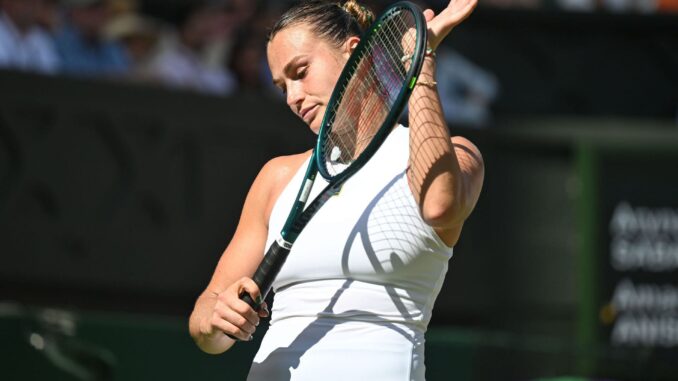
The 2025 Wimbledon Championships delivered a dramatic twist as World No. 1 Aryna Sabalenka fell to American Amanda Anisimova in a gripping semifinal clash on July 10. The match, a rollercoaster of emotions, ended with a 6-4, 4-6, 6-4 victory for the 13th-seeded Anisimova, propelling her into her first Grand Slam final. Sabalenka, known for her fiery competitiveness and powerful game, faced a familiar sting of defeat, but this time, she approached her post-match press conference with a newfound composure, determined to avoid the controversy that followed her French Open loss to Coco Gauff earlier in the year. With a sly smile, she opened the presser by saying, “You’re not gonna see a Roland Garros press conference. Anyone who was waiting for that, you can leave right now,” signaling her intent to steer clear of past mistakes.
Sabalenka’s French Open final loss to Gauff had sparked a firestorm when she attributed her defeat to her own errors rather than Gauff’s skill, saying, “I think she won the match not because she played incredible, just because I made all of those mistakes.” The remarks drew heavy criticism, prompting Sabalenka to issue a private apology to Gauff and a public mea culpa, admitting, “That was just completely unprofessional of me. I let my emotions get the better of me.” The two reconciled with a lighthearted TikTok dance before Wimbledon, a gesture that showcased their ability to move past the tension. Sabalenka’s quip at the Wimbledon press conference was a nod to this growth, reflecting her desire to present a more measured version of herself. “I just don’t want to face that hate again,” she said with a laugh, explaining her deliberate pause before facing the media to ensure she could “be Aryna, not that crazy person that was at that media day at Roland Garros.”
The semifinal match against Anisimova was a test of Sabalenka’s resilience. The Belarusian, a three-time Grand Slam champion, has dominated the 2025 season with a 47-9 win-loss record and titles in Miami and Madrid. Yet, her Wimbledon dream remains elusive, with this loss marking her third semifinal exit at the All England Club. The match was a battle of power and precision, with Anisimova’s aggressive play proving decisive. Sabalenka acknowledged her opponent’s bravery, noting, “She was more brave today. Maybe when I was just trying to stay in the point, she was going for all. She was playing more aggressive.” Despite the loss, Sabalenka showed sportsmanship, offering water to a fan suffering from heatstroke during a 20-minute match delay and sharing a heartfelt hug with Anisimova at the net.
Tensions flared during the match, particularly over a moment in the second set when Anisimova celebrated a point prematurely, prompting Sabalenka to remark, “I was just trying to chase the ball. Yeah, she was already celebrating it. I was, like, I mean, that’s a bit too early.” Another incident involved Anisimova’s failure to apologize for a net cord point in the third set, which Sabalenka felt was unsportsmanlike. “I was like, ‘You don’t want to say sorry?’ She just wanted, I guess, badly to win this match,” Sabalenka said, though she emphasized that these moments fueled her fight. Anisimova, unaware of the issue, responded, “I don’t really know what was the deal there, to be honest, because I didn’t feel like it was that interfering.”
Sabalenka’s candor about the emotional toll of defeat added depth to her post-match reflections. “Losing sucks. You always feel like you want to die, you don’t want to exist anymore, and this is the end of your life,” she admitted, capturing the raw disappointment of falling short in a Grand Slam semifinal. Yet, she quickly shifted perspective, saying, “But then you sit there a little bit and you think about what you could have done differently in the match.” Her ability to channel frustration into introspection marks a significant evolution from her French Open outburst.
Anisimova’s victory was a triumph of resilience. After taking a seven-month hiatus in 2023 to prioritize her mental health, she defied skeptics who doubted her return to the elite level. “To be honest, if you told me I’d be in the final of Wimbledon, I would not believe you,” she said, marveling at her journey to face Iga Świątek in the final. Sabalenka, despite her disappointment, praised Anisimova’s performance, acknowledging her as “the better player” in a match where stats were close—Sabalenka had 31 winners and 37 unforced errors compared to Anisimova’s 30 winners and 42 errors.
As Sabalenka prepares for the Canadian Open, her Wimbledon exit underscores her ongoing quest for the elusive grass-court title. Her graciousness in defeat, coupled with her humorous deflection of past controversies, paints a picture of a champion learning to balance raw emotion with professionalism. For now, the tennis world turns its attention to Anisimova’s historic final, but Sabalenka’s journey of growth ensures she remains a formidable force on and off the court.
Leave a Reply